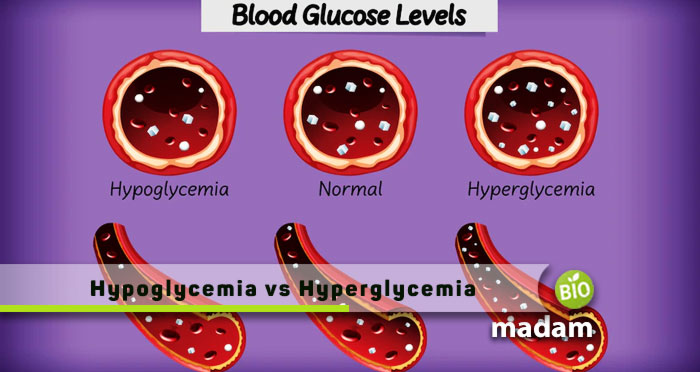Recently updated on April 18th, 2023 at 06:15 am
Hypoglycemia and hyperglycemia are the two major medical concerns regarding blood sugar. Any fluctuation in glucose levels of the body may lead to the above mentioned conditions. A hyperglycemic patient may result in diabetes, however, hypoglycemia is a condition where the blood sugar level decreases. So, the main difference between these two terminologies is the decrease and increase in normal blood sugar levels.
Hyperglycemia is often considered more dangerous due to a rise in blood glucose. However, the truth is that a low blood sugar level, hypoglycemia, is a more critical situation.
Keep reading to learn the differences in the symptoms, causes, and treatment of hypo and hyperglycemia.
Comparison Table
| Factors | Hypoglycemia | Hyperglycemia |
| Meaning | Low blood sugar | High blood sugar |
| Diagnosis | Below 70 mg/dL | Above 200 mg/dL |
| Symptoms | Weakness, hunger, dizziness, shaking, headache, etc. | Dry mouth, polydipsia, polyuria, nausea, etc. |
| Risk Factors | Confusion, slurred speech, seizures, unconsciousness, etc. | Nerve damage, limb issues, kidney failure, stroke, etc. |
| Causes | Low carbs, gaps in meals, improper insulin intake | More carbs, extra eating, resistance to insulin, etc. |
| Treatment | Glucose tablets, honey, carbohydrate intake | Insulin, medicines, and fluid replacement |
| Tests for Diagnosis | 72 hr. fasting plasma glucose | Fasting blood sugar, and urine analysis for ketones |
What is Hypoglycemia?
The word hypoglycemia comprises the suffix ‘hypo’ and the root word ‘glycemia.’ Hypo means ‘low’ or ‘less,’ whereas glycemia indicates the ‘presence of glucose in the blood’.
Thus, hypoglycemia means a lower level of glucose in the blood. Low blood sugar restricts your body activity, and you may experience multiple symptoms. Hypoglycemia symptoms may vary from mild to serious, leading to unconsciousness and death.
Low blood sugar is considered hypoglycemia when fasting blood sugar falls below 70 milligrams per deciliter (mg/dL).

While low blood sugar is often common in people with Type 1 diabetes when struggling to maintain their glucose level, it can be quite dangerous. Getting an insulin therapy, according to the patient’s condition, is essential for Type 1 diabetes patients. However, sometimes miscalculation or not taking food for a long time may cause hypoglycemia. Moreover, people without diabetes may also be susceptible to hypoglycemia symptoms.
Causes of Hypoglycemia
Hypoglycemia is typically caused by an excess of insulin in the body. It is more common in people with Type 1 diabetes, but Type 2 patients may also experience hypoglycemia if taking insulin medication. People without diabetes may experience hypoglycemia due to macro or micronutrient deficiency.
Causes of hypoglycemia in people with diabetes include:
- Taking insulin without consulting the doctor
- Delaying the meal for a long time after administering insulin
- Skipping meals or taking unbalanced meals with fiber, saturated and unsaturated fats, carbs, proteins, or vitamins.
- Late intervals between meals
- Drinking alcohol
Cause of hypoglycemia in people without diabetes are:
- Inadequate production of insulin in the body may lead to disturbed glycemic function
- Prediabetes
- Difficulties in the breakdown of food by the body
- Long-term illnesses affecting liver and kidneys functioning.
- Laparoscopy or other stomach surgeries that restrict absorption of nutrients
- Pancreas-related diseases, cysts and tumors
- Excessive alcohol intake
- Medicines like antibiotics, birth control, quinine, salicylates, and sulfa drugs
Symptoms of Hypoglycemia
The symptoms of hypoglycemia depend on the person’s current diseases or conditions and the causes of low glucose in the body. A person will experience dizziness and blurred vision when the blood sugar levels begin to drop. Symptoms of hypoglycemia due to more insulin, nutritional deficiencies, and release of other hormones include the following:
- Sweating
- Headache
- Weakness
- Shakiness
- Irritability
- Fast heartbeat
- Blurred vision
- Hangry feeling (Hunger leading to irritability or anger)
Associated Risks
If the above-mentioned symptoms of hypoglycemia are not attended to in time, the person may lose enough glucose supply to the brain. As your brain requires glucose to function properly, untreated symptoms of hypoglycemia can lead to confusion, slurred speech, seizures, unconsciousness, coma, and even death.
These serious hypoglycemia symptoms are exhibited at dangerously low glucose levels in the blood, i.e., below 54 mg/dL.
Treatment
The first response to treating hypoglycemia is giving something glucose-rich to the patient. Natural sugars are preferred over processed food. However, you must follow the proper treatment protocol for hypoglycemia, called the 15-15 rule. You have to administer glucose to the hypoglycemic person every 15 minutes.
- Give 15 grams of glucose to the person with hypoglycemia (1 tbsp honey, glucose tablets, or small candies).
- Recheck the blood sugar after 15 minutes.
- Again give 15 grams of glucose if the level is below 70 mg/dL
- Offer something to eat to the patient once the glucose level stabilizes.
Prevention of Hypoglycemia
Low blood sugar is a common issue in people with type 1 diabetes because of insulin intake. But, the levels must not be too low to lead to unconsciousness or slurred speech. You can prevent such problems by taking care of a few factors:
- Do not wait a lot between meals or after taking insulin
- Reduce intake of alcohol when taking insulin
- Ask the physician, hospital or community pharmacist about the side effects of any medication
What is Hyperglycemia?
The word ‘hyperglycemia’ is a combination of ‘hyper’ and ‘glycemia.’ Hyper indicates ‘increase’ whereas glycemia represents ‘presence of glucose in the blood.’
Thus, hyperglycemia is an increase in glucose levels, particularly in the plasma of blood, due to one or many reasons. One major reason for hyperglycemia is your body’s inability to eliminate sugar from the blood to regulate it. It could be due to inadequate production of insulin or insulin resistance.
Hyperglycemia is typically indicated by a blood glucose level higher than 200 mg/dL, fasting blood sugar of more than 126 mg/dL, and A1C above 6.4%.

Hyperglycemia is often associated with diabetes, as insulin resistance leads to diabetes in most cases. However, hyperglycemia is not always associated with diabetes. You must take care of hyperglycemia symptoms and treat the condition in time to avoid complications like stroke, kidney disease, or eye problems.
Causes of Hyperglycemia
Hyperglycemia may occur due to diabetes, surgery, or medication. Your body might not be able to get rid of extra sugar in the body due to one of the many causes of hypoglycemia, including:
- Pancreatic diseases that restrict proper pancreatic function (pancreatitis, cystic fibrosis, and pancreatic cancer)
- Endocrine conditions leading to insulin resistance
- Prolonged intake of steroids and diuretics
- Surgery
Besides these reasons for hyperglycemia, some factors may also contribute to the condition in diabetic patients like:
- Inadequate dose of insulin
- Eating diet surplus in carbs and calories
- Emotional and physical stress
- Steroids
- Reduced physical activity
Symptoms of Hyperglycemia
The symptoms of hyperglycemia are similar to the onset of diabetes and can be easily identified in people who do not have diabetes. People with diabetes and those around them should look out for these symptoms of hyperglycemia.
- Headache
- Dry mouth
- Polydipsia (extreme thirst)
- Polyuria (frequent urination)
- Nausea
- Shortness of breath
- Blurry vision
- Confusion
- Weakness
Associated Risks
Hyperglycemia is sometimes not taken seriously, and the condition aggravates with time. If you do not control the rising blood sugar levels, it can damage body tissues and organs and affect normal body function. Some primary risk factors associated with delayed treatment for hyperglycemia include nerve damage, limb issues, kidney failure, stroke, and blindness.
Treatment
Hyperglycemia generally occurs in people with diabetes due to a higher amount of carbs in the diet or inadequate insulin dose. So, the first line of action is to regulate insulin and glucose intake. Moreover, take your insulin on time if you have been skipping it.
Sometimes, hyperglycemia may need emergency treatment through insulin therapy or fluid replacement. Regular blood sugar monitoring, a healthy diet with balance of fats, proteins and carbs, and regular exercise are helpful in other situations. Nevertheless, you must check the presence of ketones in the body; avoid exercise if urine analysis reports ketones. It can further increase blood glucose levels.
Prevention of Hyperglycemia
If you have diabetes, it is important to take adequate measures to avoid hyperglycemia, as it can lead to further complications. Here are a few tips to prevent a higher glucose level in the body.
- Do not skip insulin
- Take well-balanced meals
- Add working out to your routine
- Do not sit idle for long periods
Difference Between Hypoglycemia and Hyperglycemia
Literal Meaning
Hypoglycemia
Hypo translates to ‘low,’ and glycemia means ‘glucose in the blood.’ Thus, hypoglycemia is defined as low blood sugar. It typically occurs due to a malnutrition diet or excessive insulin.
Hyperglycemia
Hyper means ‘high’, and glycemia indicates the ‘presence of glucose in the blood.’ So, hyperglycemia refers to a higher amount of sugar in the blood. Diabetic people may experience hyperglycemia on plentiful sugar intake.
Definition
Hypoglycemia
Hypoglycemia indicates low levels of blood glucose that restrict normal body functions. It is common in people with diabetes but may also result from an improper diet.
Hyperglycemia
Hyperglycemia is a higher amount of sugar in the blood. It is often confused with diabetes. However, not all people with hyperglycemia have diabetes.
Symptoms
Hypoglycemia
Symptoms of hypoglycemia include weakness, hunger, dizziness, shaking, sweating, headache, and blurred vision.
Hyperglycemia
However, the symptoms of hyperglycemia are often similar to diabetes, like headache, dry mouth, polydipsia, polyuria, nausea, shortness of breath, and confusion.
Risk Factors
Hypoglycemia
As your brain requires glucose to function properly, untreated symptoms of hypoglycemia can result in confusion, slurred speech, seizures, and unconsciousness. If further ignored, they may lead to coma or death.
Hyperglycemia
Whereas, the unattended symptoms of hyperglycemia can lead to long-term complications like nerve damage, limb issues, kidney failure, stroke, and blindness.
Causes
Hypoglycemia
Hypoglycemia may be caused by extended gaps between meals and insulin intake, skipping meals, fewer carbohydrates, and drinking alcohol. Other causes include long-term illnesses, stomach surgery, or medicines like antibiotics, quinines, and sulfa.
Hyperglycemia
On the contrary, hyperglycemia typically results from failed pancreatic and endocrine function. Other hyperglycemia causes include surgery, diuretics, steroids, inadequate insulin, a carb-rich diet, emotional and physical stress, and reduced physical activity in diabetics.
Diagnosis
Hypoglycemia
Check the patient’s blood sugar using the glucometer. A reading below 70 mg/dL indicates hypoglycemia, and you must offer immediate treatment.
Hyperglycemia
On the other hand, hyperglycemia is typically indicated by a blood glucose level higher than 200 mg/dL, fasting blood sugar of more than 126 mg/dL, and A1C above 6.4%.
Treatment
Hypoglycemia
A hypoglycemia emergency kit may contain glucose tablets, glucagon for injection, or candies. Glucagon injections stimulate the liver release stored sugar and raise blood glucose levels.
Hyperglycemia
Contrarily, you cannot offer emergency treatment to a patient with extremely high glucose levels. It is best to take them to the nearest healthcare facility so they may administer adequate fluid replacement or insulin therapy.
The Bottom Line
Hypoglycemia and hyperglycemia are the two most prevalent conditions associated with blood glucose levels. The main difference between hypoglycemia and hyperglycemia is that one indicates low blood sugar while the other shows high blood sugar levels. Contrary to popular belief, they are not specifically linked to diabetes. Symptoms and causes of hypoglycemia and hyperglycemia can help distinguish the two easily. Adequate treatment can save you or your loved ones from further complications.

Anna has completed her degree in Pharmacy from the University of Hawaii. She is serving as a research assistant in a pharmaceutical company. She had a great interest in writing blogs, traveling to different parts of the US, and trying delicious recipes in her spare time.

